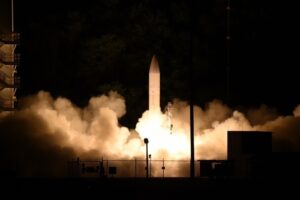The U.S. Army plans to field its first Long Range Hypersonic Weapon (LRHW) battery this fall, as LRHW training continues at Joint Base Lewis-McChord (JBLM), Wash., Army Secretary Christine Wormuth said on Feb. 27.
“Our first battery of Long Range Hypersonic Weapons is training with their ground equipment at JBLM, and by this fall we will have our first battery of Long Range Hypersonic Weapons, and that element will be part of our first multi-domain task force,” she told an American Enterprise Institute forum on the Army’s role in the Indo-Pacific. “We’re also gonna be bringing out the prototype for our Mid-Range Capability (MRC), which provides us the opportunity to take out mobile targets at long range.”

The Army’s LRHW fielding schedule looks to be on track, as Lt. Gen. Neil Thurgood, director of the Army’s Rapid Capabilities and Critical Technologies Office (RCCTO), said last August that the service would deliver the first LRHW rounds in six months in preparation for achieving LRHW operational capability by the end of this fiscal year (Defense Daily, Aug. 10, 2022).
LRHW development is a joint effort with the Navy designing the Common Hypersonic Glide Body (C-HGB) and the Army overseeing production.
In 2019, the Army chose Lockheed Martin [LMT] to serve as the weapon systems integrator for the LRHW, which will be fired from a truck, while Dynetics [LDOS] is tasked with producing the C-HGB (Defense Daily, Aug. 30, 2019).
Lockheed Martin is also the prime contractor for the Army RCCTO’s MRC prototype ground battery, which is to fire SM-6 and Tomahawk missiles.
The MRC, also called the Typhon Weapon System, is to hit targets in the range between the future Precision Strike Missile and LRHW (Defense Daily, Dec. 9, 2022).